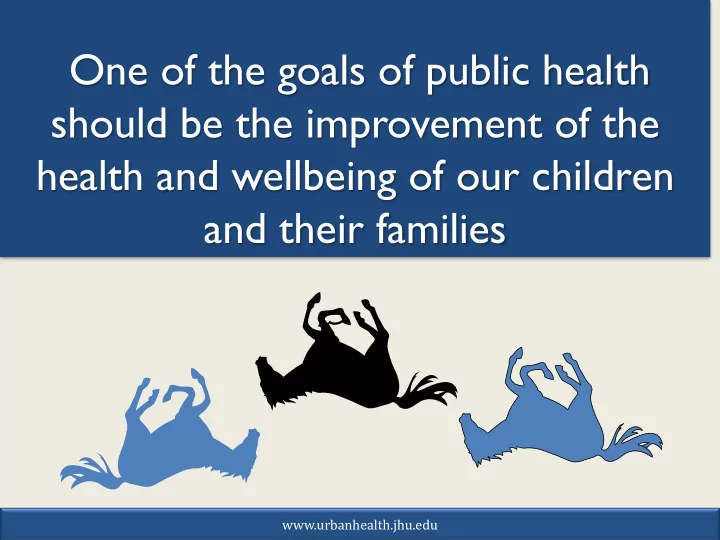

One of the goals of public health should be the improvement of the health and wellbeing of our children and their families www.urbanhealth.jhu.edu
Dakota tribal wisdom says that when you discover you are riding a dead horse, the best strategy is to dismount. www.urbanhealth.jhu.edu
However, we of the public health persuasion often try other strategies with dead horses, including the following: www.urbanhealth.jhu.edu
We can’t get rid of our dead horses, that’s what we are famous for. www.urbanhealth.jhu.edu
We should appoint a committee of university faculty to study the dead horse problem. www.urbanhealth.jhu.edu
Maybe if we raised more money that would increase the dead horse’s performance. www.urbanhealth.jhu.edu
Let’s set up a research project to study the dead horse some more. www.urbanhealth.jhu.edu
Let’s create a course to increase our riding ability. www.urbanhealth.jhu.edu
If we increased the standards to ride dead horses wouldn’t that lead to improvement? www.urbanhealth.jhu.edu
Don’t you know that a dead horse is “better, faster and cheaper.” www.urbanhealth.jhu.edu
We professors can create an intervention and study sample that with creative analyses can find an impact of the dead horse at least that of a placebo. www.urbanhealth.jhu.edu
We arrange to visit other communities to see how they ride dead horses. www.urbanhealth.jhu.edu
We pay little attention to the world being very different when 13 years after development research interventions begin to be used in non-research settings. www.urbanhealth.jhu.edu
“If we only had more funding, maybe our horses wouldn’t be so dead.” www.urbanhealth.jhu.edu
We use our new resources to hire a researcher to study our dead horses. www.urbanhealth.jhu.edu
Dakota tribal wisdom says that when you discover you are riding a dead horse, the best strategy is to dismount. WE NEED TO DISMOUNT!!!!! www.urbanhealth.jhu.edu
THANK YOU AND ENJOY THE REST OF THE DAY. www.urbanhealth.jhu.edu
Urban Health Institute Our Goal Statement T o strengthen university- community collaborations to improve the health and well-being of Baltimore www.urbanhealth.jhu.edu
Urban Health Institute Our Objectives • Serve as a bridge between JHI and Baltimore to share information, foster connections, facilitate dialogue, and establish collaborations • Strengthen the capacity of the Baltimore community by bringing the knowledge and skills available through JHI to community-identified needs and issues and vice versa • Highlight and honor programs and services that improve the health and well-being of Baltimore • Amplify community voices www.urbanhealth.jhu.edu
Sharing Knowledge Information and Fostering Connections • Baltimore Dialogues: conversations held with focusing around a book or article focused on issues of race, power, and privilege; held quarterly in fellowship hall at Amazing Grace • Social Determinants of Health Symposium: Every Spring hosts a day-long Symposium, between 550 and 800 registrants annually • Baltimore Researchers’ Dinners: Three times a year dinners on city-wide topics of interest for researchers www.urbanhealth.jhu.edu
Collaboration Building Community-Driven Research Day: Community-based organizations/city agencies present data and research needs and students and faculty from Johns Hopkins and other local universities to identify potential collaborations. Annual event. Small Grants Program: Established to advance community- university collaborations focused on either research or program development. Grants are awarded to partnerships that most successfully demonstrate the potential for advancing the health and well-being of the residents of Baltimore. Up to $100,000 awarded annually. www.urbanhealth.jhu.edu
Building Capacity Capacity Building Workshops: each of the following offered annually • Writing for Success: Preparing Winning Grants • Program Monitoring and Evaluation • Financial Management of Not-for-Profit CBOs • A Framework for Change: Creating Logic Models that Improve Impact www.urbanhealth.jhu.edu
Building Capacity: Bunting Neighborhood Leadership Program Identify and train the next generation of neighborhood leaders Baltimore. • 6 fellows in inaugural 2017 cohort; 6 in 2018 cohort • Faculty: both Hopkins and community experts • Program is 8 hours weekly for a year with two years of additional mentorship • Current support for 5 years www.urbanhealth.jhu.edu
www.urbanhealth.jhu.edu
East Baltimore Community Trauma Response • Started as a collaborative project between UHI, JHI, and community partners for the development and implementation of trauma response programs in East Baltimore expanded by the Center for the Prevention of Youth Violence. • Funded by the Stavros Niarchos Foundation to create a more trauma-informed and trauma-responsive Johns Hopkins Hospital and to collaborate with individuals and community partners to support victims of violence in East Baltimore www.urbanhealth.jhu.edu
East Baltimore Community Trauma Response • Training of staff at Johns Hopkins Hospital beginning with the Emergency Department, Trauma Surgery, and Pediatrics • Reviewing policies and practices that could negatively impact individuals experiencing trauma • Training first responders and mental health professionals working in City Schools and health settings in East Baltimore • Trauma responses to community and school incidents www.urbanhealth.jhu.edu
• Philip Leaf • pleaf@jhu.edu • Room 819 Hampton House www.urbanhealth.jhu.edu
Recommend
More recommend